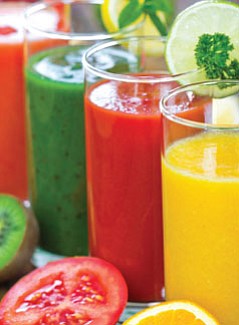SILVER SPRING, Md. — As fall arrives, so do drives in the country and drinking fresh-squeezed juices and cider.
Unfortunately, serious outbreaks of foodborne illness, often called “food poisoning,” have been traced to drinking fruit and vegetable juice and cider that have not been pasteurized or otherwise treated to kill harmful bacteria.
The U.S. Food and Drug Administration (FDA) reminds consumers this fall to read the label carefully on juice and cider products.
Juices provide many important nutrients, but consuming untreated juices can pose health risks to your family. When fruits and vegetables are fresh-squeezed or used raw, bacteria from the produce can end up in your juice or cider. Unless the produce or the juice has been treated to destroy any harmful bacteria, the juice could be contaminated. While most people’s immune systems can usually fight off the effects of foodborne illness, children, older adults, pregnant women, and people with weakened immune systems (such as transplant patients and individuals with HIV/AIDS, cancer, and diabetes) risk serious illnesses or even death from drinking untreated juices.
Most of the juice sold in the United States is pasteurized (heat-treated) to kill harmful bacteria. Juice products may also be treated by non-heat processes for the same purpose. However, some grocery stores, health food stores, cider mills, farmers’ markets, and juice bars sell packaged juice that was made on site that has not been pasteurized or otherwise processed to ensure its safety. These untreated products should be kept under refrigeration and are required to carry the following warning on the label:
WARNING: This product has not been pasteurized and therefore may contain harmful bacteria that can cause serious illness in children, the elderly, and persons with weakened immune systems.
However, the FDA does not require warning labels on juice or cider that is fresh-squeezed and sold by the glass, such as at apple orchards, farmers’ markets, roadside stands, and juice bars.
Follow these simple steps to prevent illness when purchasing juice:
•Look for the warning label to avoid the purchase of untreated juices. You can find pasteurized or otherwise treated products in your grocers’ refrigerated sections, frozen food cases, or in non-refrigerated containers, such as juice boxes, bottles, or cans. Untreated juice is most likely to be sold in the refrigerated section of a grocery store.
•Don’t hesitate to ask if you are unsure if a juice product is treated, if the labeling is unclear, or if the juice or cider is sold by the glass.
Consuming dangerous foodborne bacteria will usually cause illness within one to three days of eating the contaminated food. However, sickness can also occur within 20 minutes or up to six weeks later. Symptoms of foodborne illness include: vomiting, diarrhea, abdominal pain, and flu-like symptoms (such as fever, headache, and body ache). If you think that you or a family member has a foodborne illness, contact your healthcare provider immediately.
